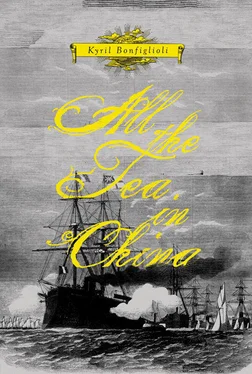Hour upon hour I watched, entranced, the changing pageant of this English Channel, asking a hundred questions of anyone who could pause and explain to me. Some of the more spanking merchant-craft had, like the Royal ships, already bent on their best suits of sails, all snowy-white, but most were still under working canvas, brown and weathered, patches and discoloration telling wordless tales of thousands upon thousands of perilous sea-miles. The Second Mate pointed out to me, in one of his rare moments of fellowship, a particularly foul-seeming craft, its sails of an inexplicable filthiness. He explained that it was a whaler, wallowing back from the furthest Southern seas, and that the greasy grime was from the smoke of the “trying-out” fires which rendered down the blubber from the great beasts.
“A horrid trade, young man,” he said in his lugubrious way. “Permit an older man to give you a word of advice. If ever you fall in with a whaler’s man, buy him a pot of beer but quit his company as soon as you safely can. He will be fearfully strong, easily roused to anger and possessed of a long, sharp knife. Eschew his company; he will not be sane. These words of mine are worth a guinea a box.” With that he turned away moodily. He was a strange man, not one of whom one could make a boon-companion. He was unflagging at his duties. I think that, when not on watch, he either slept or wept. Perhaps both. Certainly, I never saw him eat or smile.
The doctor respected him, which was strangely reassuring.
The lights of Ushant, when Peter dragged me out of my bunk to admire them, seemed no great thing — merely a distant twinkle on our port bow. The beauty of them, it seemed, the thing to be admired, was that we had sighted them at just the time the Captain had predicted and at just such a distance as enabled us to “weather them with plenty of sea-room” as Peter lucidly put it. After an hour or so — but it seemed longer — they were on our beam and, finally, they were but a remote glimmer on our quarter. We did not tack to port for, I was told, that would have driven us deep into the dreaded Biscay Bay itself. (I did not complain: I had no especial longing to tack to port and would have had less had I known what the phrase meant.)
We braced our yards so that we were sailing as close to the wind as our yare little ship could stand, every scrap of canvas and cordage and timber booming and shrieking and groaning as though intent on frightening the very guts out of me. Since there seemed to be little I could do to help, I retired to my bunk with an air of philosophical detachment. Biscay held no terrors for me: I was proud. There was some small difficulty attached to staying in my bunk because of the ship’s erratic and wanton motions: resourcefully, I fished out the absurd slabs of woollen underclothing from my chest and wedged them in such fashion that I could no longer fall out. I slept well.
In the dawn I was awakened by a curious dream in which I had been standing on my head. When I came to my senses I found that I was indeed doing so, although still flat on my back. My head was pressed firmly against the head-board of my bunk, taking the whole weight of my body. I realised that the ship was standing on its nose and that my last hour had come. Before I could decide what to do I found myself standing almost upright on the footboard of the bunk, although still flat upon my back. The ship was now, quite clearly, sitting on its stern. I was not to be seen at a disadvantage again and, in a few minutes, when Peter slid into the cabin, I was fully clothed and as nonchalant as any salted Jack Tar.
“Are we sinking yet?” I asked nonchalantly.
“Not yet,” he replied. “But have you heard of mountainous waves? And dismissed them as poetic extravagance?”
“Of course.”
“Then come on deck; I have a treat for you.” At his suggestion I forced my way into some stiff and crackling yellow oilskins before venturing out. I felt absurd in these but so soon as I had, with Peter’s help, fought my way like a drunken man onto deck, I was glad of them for the wind kicked me in the face, green water smashed at me from the whole length of the ship, compressed me against the bulwark of the quarter-deck and so overwhelmed me with its cold, fierce lust that I was ready to surrender my life. Peter had a firm grip of the left arm of my oilskins; he dragged me up and across the heeling deck to the weather side and fastened each of my hands around the rail. Then he took my head and rotated it towards the right, so that I was staring forrard.
My fingers clenched into the rail so hard that they must have scarred it: a mountain of a wave — I mean a mountain, there was no poetic licence about it — was reared dead ahead of us and our absurd little ship was aiming its bowsprit straight into the scend of it. It was no moment for terror: our extinction was inevitable. I watched as though mesmerised. Up and up went our bows until Peter and I were bent almost level with the deck and still the peak of the glassy green mountain was high above us. I prepared in my mind a few suitable words of gratitude and farewell to say to Peter but, before I could speak, I heard a great roar from the Captain, behind and above us on the quarter-deck.
“Mr Lubbock!” he bellowed, “ Mister , I say! Your watch is idling; the lee-braces are as slack as a whore’s stays. When your men have done picking their noses, pray get them to work or they’ll suffer a fine of a shilling each. Yes, a shilling I say!”
I gazed aghast at Peter for, clearly, Captain Knatchbull was insane. Peter pursed his lips in a vexed way and, cupping his mouth, shouted in my ear “I know what you are thinking. A shilling is a little severe: the men were only sheltering in the lee of the main-mast bitts and yarning to pass the time away because there was no work on hand you see: it was Lubbock’s fault that he did not keep them busy.”
My gape of incomprehension was ill-timed for we had just then fought our way to the very top of the fearful mountain of water and its crest broke over us, sending a hundred tons of “green” the length of our deck, much of which I swallowed. When I had exuded it I glanced at Peter. His face was unnaturally straight and expressionless. Against the evidence of my senses I came to realise that these unspeakable demonstrations of Nature’s violence were neither rare nor considered perilous by those who went down to the sea in ships. We were, at that moment, pitching down the further slope of the watery mountain at such a rate and such an angle that it took all my manhood to speak casually.
“Do you have the watch, Peter?” I asked.
“No, not yet.”
“Then why are you here?”
“Fresh air, my boy, fresh air! Just fill your lungs, isn’t it splendid? Many an invalid would give a fortune for such stuff.”
I believe he said something else but it was smothered by another monstrous surge of water, bidding fair to sweep us overside. I noticed that he unobtrusively kept a firm grip of my oilskins: I appreciated this although I said nothing.
“Karli,” he said.
“Yes?”
“I have to speak seriously to you.”
“Yes, Peter?”
“We may never have the opportunity to speak in privacy again.”
“I understand,” I said fervently.
“D’you see, we shall soon be entering the Tropics, where the Lord’s writ doesn’t run, where the stars take on unfamiliar patterns and men can turn into beasts overnight. You will take my word for these things, will you not?”
“Indeed I shall, Peter,” I quavered.
“Now, more to the point, these strange Tropic manifestations work equally upon cooked meat.” He laid a friendly arm upon my shoulder. “What I am trying to say, my dear chap, is that the galley fire has been out for ten hours and that there will be but short commons for breakfast. You, however, have not one or two but, so you tell me, three salt ox-tongues in your tin shirt-box. Do you not think that you should broach one this morning, before the sands of time run out for us both?”
Читать дальше












